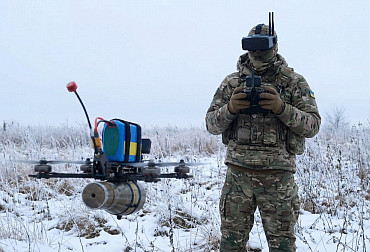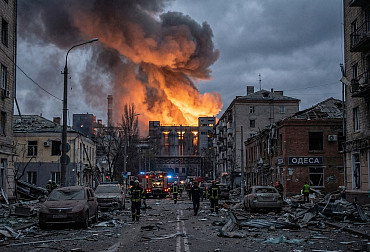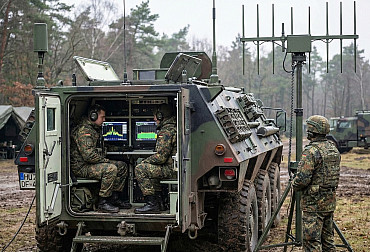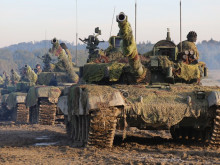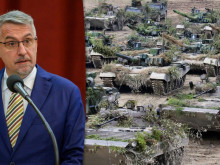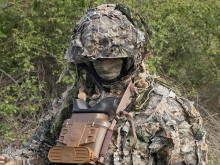Investment in defence is not out the window. It enhance national and allied security and has a significant economic return
With the launch of the Russian attack against Ukraine in February this year, the general perception of the role of the armed forces and the defence industry has shifted fundamentally. High-intensity symmetrical armed conflict has long been difficult to imagine in the European space. In inverse proportion to this, 'armourers' have long been subjected to pressure from various quarters with arguments rooted in ecology and 'environmentalism', salon pacifism and the more traditional notion that, when there is no threat, it is appropriate to invest public funds in more 'necessary' projects than armaments, equipment, human resources or the immovable infrastructure of the armed forces.
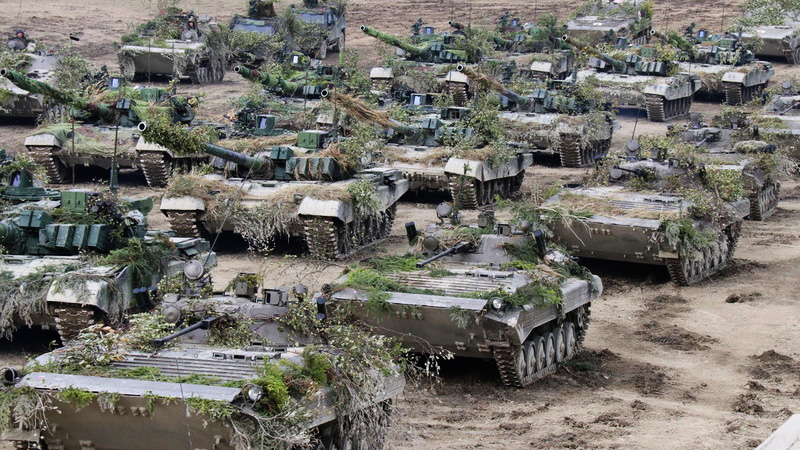 Picture: With the launch of the Russian attack against Ukraine in February this year, the general perception of the role of the armed forces and the defence industry has shifted significantly. (illustration photo) | Ministry of Defence of the Czech Republic
Picture: With the launch of the Russian attack against Ukraine in February this year, the general perception of the role of the armed forces and the defence industry has shifted significantly. (illustration photo) | Ministry of Defence of the Czech Republic
The suddenly recognised reality of the Russian Government's willingness to address its policy ideas with artillery and tanks then caused many to reflect. Ukraine as a weaker and contested country gained immediate sympathy. Along with the efforts to support this country, the hidden inadequacies and unpreparedness in terms of (not only) the amount of available equipment or ammunition that could be provided to a defending Ukraine by other countries (including the Czech Republic) in real time were simultaneously revealed to the unbiased public. Thanks to the events in Ukraine, most countries that had hitherto greatly underestimated their defence also announced significant increases in their defence budgets. This alone, of course, is not enough. As essential as money is for waging war, it is first and foremost necessary to have something to buy with it. In particular, effective equipment and technology, which are then placed in the hands of well-prepared soldiers. And it is precisely this equipment and technology that will never be developed and produced by anyone other than the defence industry.
However, as the conflict has been going on for several months now and the accumulated economic problems have been prolonged or compounded (not only those caused by the apparently overly restrictive covid measures), the opposite effect is threatened - or rather a quicker return to a more traditional approach. People are getting used to the ongoing war to a certain extent (some signs can already be seen), the events of the war in Ukraine do not resonate so much across the media and each new potential war crime is added to the already plethora of previous ones, thus gradually reducing the level of public attention that is increasingly devoted to current and future economic problems. Politicians who showed sympathetic resolve to support Ukraine at the start of the war will thus find it increasingly difficult to defend higher defence spending to a shrinking public in the period ahead. At the same time, the situation will be a major temptation for the opposition across Europe. The more statesmanlike will say that governments have not done well in their aid to Ukraine and in their support for building up the domestic army and are wasting it. The more statesmanlike will make speeches to fight for world peace. Not to mention the risk that the issue may be exploited by extremists offering quick and easy solutions.
The current Czech Government does not underestimate defence in its programme statement, which was presented before the Russian attack, and it is clear from the wording of the individual points (see below) that it was its intention to correct old mistakes before the war, in the form of debt repayment and gradual investment in the modernisation of the Czech Army, which corresponds to a long-standing and unkept commitment to the Alliance. This is not an end in itself, although it is not sufficient as an indicator in itself, and it depends very much on the specific ways in which the increased funds are used.
- "We will increase the country's defence spending in line with our Alliance commitments to reach the level of 2% of GDP already in the 2025 budget." (and probably as early as 2024 after assessing the impact and risks of a Russian attack)
- "We will support the involvement of the Czech defence industry in projects funded by the European Defence Fund and the NATO Innovation Fund."
The first-mentioned intention is a repayment of a debt to the Army and to the security of the Czech Republic in general, and to our NATO allies in particular. Let us stop at the second point, in which the Government explicitly talks in its programme statement about support for the defence industry. Other European states are formulating their positions in a similar way - and yet, as Jiří Hynek, the president of the Association of Defence and Security Industry, has long been reporting, the supranational institutions of the European Union and the banking sector are continuing, as if on inertia, the pre-war policy according to which the defence industry is something that harms rather than benefits society, and throwing absurd sticks under its feet. At the same time, this approach may run the risk of the outlined need to 'help people', as the opposition may wish to put it, for whom the priority may be to get the best possible result at the next election rather than a responsible and consistent defence policy.
A very important argument in favour of supporting the defence industry in terms of expanding its capacities (production, development and other) is that, according to previous experience, investments in defence, if directed primarily to the domestic defence industry, have very beneficial effects for the national economy, which more than compensate for the initial and necessary costs. Not only then, but, of course, above all, if in calm times it is strongly export-oriented, i.e. competitive on the world (civilised world) market, free of unnecessary obstacles and supported by the state to the maximum extent possible.
The primary benefit of investing in the domestic defence industry is naturally to increase the security of the Czech Republic. Despite the fear that the war in Ukraine will become a long-term attrition conflict, or even end in an outcome that is not desirable for Ukraine and its supporters, it is to be expected that this "lesson" has indeed rather awakened most politicians across the continent, and they will not take back their spring decisions to increase funding and accelerate defence projects even in an economically (and therefore politically) difficult situation. Only well-prepared and well-equipped armed forces capable of rapid and effective coordinated deployment with allies can reliably deter an unscrupulous adversary from "pursuing politics by other means". No amount of economic, let alone political, promises will achieve this; only a convincing military force will.
At the same time, funds directed to defence and the defence industry, which aim to increase the capabilities of its own armed forces, are a very powerful investment incentive. The defence industry is characterised by a high level of added value. As a rule, these are products that are developed, tested and manufactured in the Czech Republic. The contracts thus have a significant economic benefit: an example is the recent order for special variants of Pandur II wheeled armoured vehicles (liaison and command and staff). In addition to the positive impact on employment, the cooperation of many subcontractors, mostly Czech, has brought value to the Czech economy of more than three times the amount invested by the state.
In addition to the economic benefits, it is also important to emphasise the non-economic ones, which in the long term contribute significantly to the overall economic growth or support it as indispensable prerequisites. In this respect, we are talking about the strategic self-sufficiency of the Czech Republic, where production takes place primarily on Czech territory, thanks to which the vast majority of the funds spent do not go abroad, and at the same time, security of supply is ensured in the event of crises. It is also about the creation and maintenance of strategic know-how, the associated possibility of further development of technology and the possibility of sub-licensing. It is also about developing human resources through cooperation between the military technical institutes and the private sector, deepening specific technological knowledge, increasing the experience and skills of employees and thus their value on the labour market. An important benefit is also the international overlap of orders through cooperation with foreign partners and successful export.
With regard to the complexity of modern, especially heavy and aeronautical equipment, but also many other technologically demanding and specific means (e.g. drones), we cannot do without the acquisition of foreign products, but at the same time it is true that the deepening experience of the Czech defence industry companies allows an increasing level of its involvement in these projects, where companies acquire know-how and expanding capabilities and possibilities for the future. Exporting enables the defence industry to effectively maintain its capabilities, which can then be fully utilised by the state in the event of a crisis. It is thus an issue inextricably linked to national security, and any artificial obstacles in the way of the defence industry are ultimately a reduction in the effectiveness of defence in the face of an adversary determined to assert its interests by brute force. Thus, increased investment in defence, which is directed to the maximum extent possible to companies based and paying taxes in the Czech Republic, is clearly an economic benefit. Ensuring defence is the primary task and purpose of the state, and this and future governments should not deviate from the course they have taken.












